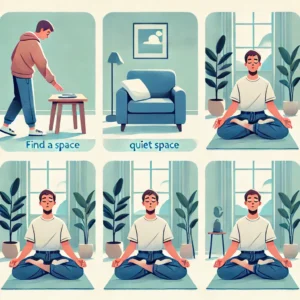The Ultimate Guide to Meditation for Beginners
Introduction
Meditation is a powerful practice that has been used for thousands of years to calm the mind, reduce stress, and promote overall well-being. For beginners, starting a meditation practice might seem daunting, but it doesn’t have to be. This ultimate guide will walk you through everything you need to know to begin your meditation journey, from understanding the basics to developing a consistent practice.
What is Meditation?

Meditation is a mental practice that involves focusing the mind on a particular object, thought, or activity to achieve a mentally clear and emotionally calm state. It is often associated with mindfulness, a state of awareness of the present moment without judgment.
Benefits of Meditation

Meditation offers numerous physical, mental, and emotional benefits. Whether you’re looking to reduce stress, improve concentration, or enhance your emotional well-being, meditation can help.
1. Reduces Stress
One of the most well-known benefits of meditation is its ability to reduce stress. By calming the mind, meditation lowers the production of stress hormones like cortisol.
2. Improves Focus and Concentration
Regular meditation practice enhances your ability to focus and concentrate. It trains the mind to stay on task and reduces distractions.
3. Promotes Emotional Health
Meditation has been shown to improve mood and increase feelings of happiness. It helps you develop a more positive outlook on life by fostering self-awareness and acceptance.
4. Enhances Self-Awareness
Through meditation, you become more aware of your thoughts, feelings, and behaviors. This heightened self-awareness can lead to personal growth and better decision-making.
5. Improves Sleep Quality
Meditation can help you achieve a more restful sleep by calming the mind and reducing the mental chatter that often keeps people awake at night.
Common Myths About Meditation

Before diving into meditation, it’s important to dispel some common myths that might prevent you from starting.
1. “You Need to Clear Your Mind Completely”
A common misconception is that meditation requires you to empty your mind of all thoughts. In reality, meditation is about observing your thoughts without getting attached to them, not erasing them.
2. “Meditation is Only for Spiritual People”
While meditation has spiritual roots, it is a practice that anyone can benefit from, regardless of religious or spiritual beliefs.
3. “You Need to Meditate for Hours”
Even just a few minutes of meditation each day can have significant benefits. You don’t need to spend hours in meditation to see results.
Types of Meditation
There are many different types of meditation, each with its unique focus and benefits. As a beginner, you can experiment with different styles to find what resonates with you.
1. Mindfulness Meditation
Mindfulness meditation involves focusing on the present moment without judgment. It often includes paying attention to your breath, bodily sensations, or surroundings.
2. Guided Meditation
In guided meditation, an instructor leads you through the practice, often helping you visualize peaceful scenes or focus on specific goals.
3. Loving-Kindness Meditation (Metta)
This type of meditation involves directing positive thoughts and well-wishes towards yourself and others. It promotes compassion and empathy.
4. Transcendental Meditation
Transcendental Meditation involves silently repeating a mantra to settle the mind into a state of restful awareness. It is practiced for 20 minutes twice a day.
5. Body Scan Meditation
Body scan meditation involves mentally scanning your body for tension or discomfort and consciously relaxing those areas. It’s often used to reduce stress and improve sleep.
How to Start Meditating

Starting a meditation practice is simple. Follow these steps to begin your journey into meditation.
1. Find a Quiet Space
Choose a quiet place where you won’t be disturbed. It could be a dedicated meditation corner, a room, or even a spot in nature.
2. Get Comfortable
Sit or lie down in a comfortable position. You can sit on a chair, cushion, or directly on the floor. The most important thing is to keep your back straight.
3. Focus on Your Breath
Close your eyes and bring your attention to your breath. Notice the sensation of the air entering and leaving your body. If your mind starts to wander, gently bring your focus back to your breath.
4. Start Small
If you’re new to meditation, start with just 5-10 minutes a day. As you become more comfortable, you can gradually increase the duration of your practice.
5. Be Patient and Consistent
Like any new habit, meditation takes time to develop. Be patient with yourself and try to meditate at the same time each day to build consistency.
Tips for Maintaining a Regular Meditation Practice
Consistency is key to reaping the full benefits of meditation. Here are some tips to help you maintain a regular practice.
1. Create a Routine
Incorporate meditation into your daily routine, such as meditating first thing in the morning or before bed. Consistency helps reinforce the habit.
2. Use Apps or Online Resources
There are many apps and online resources that offer guided meditations and timers to help you stay on track. Popular options include Headspace, Calm, and Insight Timer.
3. Join a Meditation Group
If you find it challenging to meditate alone, consider joining a meditation group or class. Practicing with others can provide motivation and support.
4. Set Realistic Goals
Start with small, achievable goals, like meditating for five minutes each day. As you progress, you can gradually increase your meditation time.
5. Be Kind to Yourself
Remember that meditation is a practice, not a perfection. It’s normal for your mind to wander, especially as a beginner. Be kind to yourself and gently bring your focus back each time.
Overcoming Common Challenges

Meditation, like any new practice, can come with its challenges. Here’s how to overcome some common obstacles.
1. Restlessness
It’s normal to feel restless when you first start meditating. If you find it difficult to sit still, try a moving meditation like walking meditation.
2. Busy Mind
A busy mind is a common challenge for beginners. Instead of trying to suppress your thoughts, observe them without judgment and gently return to your breath.
3. Inconsistent Practice
Life can get busy, making it hard to stick to your meditation practice. If you miss a session, don’t be discouraged—just get back on track the next day.
Incorporating Meditation into Daily Life

Meditation doesn’t have to be limited to a specific time or place. You can incorporate mindfulness into your daily activities to enhance your practice.
1. Mindful Eating
Pay full attention to the experience of eating. Notice the flavors, textures, and aromas of your food. Eating mindfully can enhance your appreciation of your meals and help you connect with the present moment.
2. Mindful Walking
Whether you’re walking in nature or through the city, bring your attention to each step. Notice the sensation of your feet on the ground, the rhythm of your breath, and the sights and sounds around you.
3. Mindful Listening
Practice being fully present during conversations. Listen without interrupting and focus on understanding the other person’s perspective.
4. Mindful Breathing
Take a few moments throughout the day to focus on your breath. This simple practice can help you reset and stay grounded, especially during stressful situations.
Conclusion: Your Meditation Journey Begins Now

Meditation is a powerful tool for enhancing your mental, emotional, and physical well-being. As a beginner, the key is to start small, be patient, and stay consistent. With time, meditation can become a transformative part of your life, helping you find peace and balance in a busy world.
References
1. What is Meditation?
• Mayo Clinic: Meditation: A Simple, Fast Way to Reduce Stress
• National Center for Complementary and Integrative Health (NCCIH): Meditation: In Depth
2. Benefits of Meditation
• American Psychological Association (APA): The Benefits of Meditation
• Harvard Health Publishing: The Health Benefits of Meditation
3. Common Myths About Meditation
• Verywell Mind: 7 Common Myths About Meditation
• Headspace: Debunking Meditation Myths
4. Types of Meditation
• Mindful: 9 Types of Meditation: Which One Is Right for You?
• Healthline: 7 Types of Meditation: Which One Is Best for You?
5. How to Start Meditating
• Zen Habits: How to Meditate Daily
• The New York Times: How to Meditate
6. Tips for Maintaining a Regular Meditation Practice
• Headspace: How to Create a Meditation Routine
• Psychology Today: The Key to Building a Successful Meditation Practice
7. Overcoming Common Challenges
• Mindful: How to Handle Challenges in Meditation
• Tiny Buddha: Overcoming Obstacles in Meditation
8. Incorporating Meditation into Daily Life
• Mindful: How to Practice Mindfulness Throughout Your Day
• Greater Good Science Center: 5 Ways to Bring Mindfulness Into Your Daily Life
